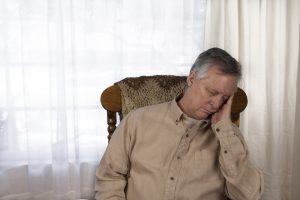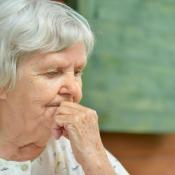 Seniors who experience excessive fatigue during the day may have more brain atrophy than well-rested seniors, according to a study presented at SLEEP 2016, the 30th Anniversary Meeting of the Associated Professional Sleep Societies (APSS). Researchers found atrophy was greatest in regions of the brain vulnerable to Alzheimer’s and age-related decline, suggesting fatigue could be an early sign of brain degeneration.
Seniors who experience excessive fatigue during the day may have more brain atrophy than well-rested seniors, according to a study presented at SLEEP 2016, the 30th Anniversary Meeting of the Associated Professional Sleep Societies (APSS). Researchers found atrophy was greatest in regions of the brain vulnerable to Alzheimer’s and age-related decline, suggesting fatigue could be an early sign of brain degeneration.
The Link Between Fatigue and Brain Atrophy
For their study, researchers worked with 1,374 cognitively normal seniors age 50 and older who participated in the Mayo Clinic Study of Aging. Participants completed surveys of sleepiness and fatigue and underwent magnetic resonance imaging (MRI) brain scans to establish baseline brain functioning.
Participants who reported high levels of daytime sleepiness had lower cognitive scores and more medical problems. They were also more likely to report sleep disturbances, pointing to a correlation between disturbed sleep and daytime fatigue.
Changes in Sleep: Early Dementia Warning Sign?
The study’s authors suggest these results may help doctors identify people at risk for dementia, increasing opportunities for early treatment. Previous research supports this claim. According to the Alzheimer’s Association, changes in sleep habits are common among people with Alzheimer’s. This may be due to the ways Alzheimer’s changes the brain. Some common Alzheimer’s-related sleep changes include:
- Insomnia and disturbed sleep.
- Changes in dreaming patterns. Brain scans show people with dementia spend less time in both dreaming and non-dreaming sleep cycles.
- Changes in the sleep cycle, such as napping during the day, or feeling drowsy during the day.
- Sundowning, an experience characterized by behavioral and cognitive changes late in the afternoon or evening.
In the late stages of Alzheimer’s, seniors may spend as much as 40% of their nights awake, as well as a significant portion of the day sleeping.
The National Sleep Foundation says some age-related changes in sleeping are normal. The foundation recommends 7-8 hours of sleep per night for seniors 65 and older, compared to 7-9 hours for adults younger than 65. The American Academy of Pediatrics is also supporting a new revised recommendation from the American Academy of Sleep Medicine for children’s sleep guidelines. Also presented at SLEEP 2016, these recommendations now include as many as 16 hours of sleep for infants, 14 hours for young children, and 12 hours for school-age children.
References:
- Brooks, M. (2016, June 14). New AASM guideline on optimal sleep for children. Retrieved from http://www.medscape.com/viewarticle/864846
- National Sleep Foundation recommends new sleep times. (2015, February 2). Retrieved from https://sleepfoundation.org/media-center/press-release/national-sleep-foundation-recommends-new-sleep-times
- Sleepiness and fatigue linked to brain atrophy in cognitively normal elderly. (2016, June 14). Retrieved from http://www.eurekalert.org/pub_releases/2016-06/aaos-saf061416.php
- Treatments for sleep changes. (n.d.). Retrieved from http://www.alz.org/alzheimers_disease_10429.asp

The preceding article was solely written by the author named above. Any views and opinions expressed are not necessarily shared by GoodTherapy.org. Questions or concerns about the preceding article can be directed to the author or posted as a comment below.

 15 Secrets for a Good Night’s Sleep
15 Secrets for a Good Night’s Sleep At a Loss: The Day-to-Day Toll of Dealing with Dementia
At a Loss: The Day-to-Day Toll of Dealing with Dementia Aging and Yoga Psychology: Conquering the Kleshas
Aging and Yoga Psychology: Conquering the Kleshas

